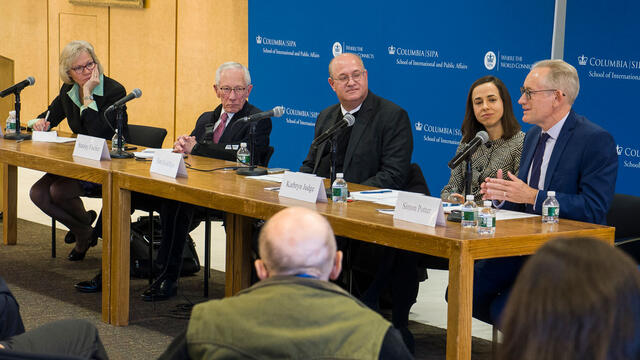
Events Examine Key Aspects of Central Banks Worldwide

SIPA’s Central Banking and Financial Policy Initiative, in partnership with the MPA in Economic Policy Management Program organized several events in February to consider key aspects of central banks worldwide, including transparency, accountability, and participation in the global economy.
Panel Discussion on Central Bank Independence, February 3
Watch video »
Participants: Stanley Fischer, a former vice chair of the Federal Reserve and former governor of the Bank of Israel; Ilan Goldfajn, a former governor of the Central Bank of Brazil; Simon Potter, a former executive vice president at the Federal Reserve Bank of New York.
Moderators: Patricia Mosser, SIPA; Kathryn Judge, Columbia Law School.
Co-sponsors: Central Banking and Financial Policy @ SIPA; MPA-EPM Program; Center on Global Economic Governance
Panelists discussed issues including how central banks can maintain operational independence and integrity in an environment of rising populism and political interference; whether and how the banks should add to their portfolios additional objectives such as financial stability, micro-prudential tools, sustainable investment, and climate change mandates; and ways that central banks can better coordinate monetary and fiscal policy without imperiling their independence on the former.
Panel Discussion on Practical Policymaking Challenges, February 10.
Watch video »
Participants: Jacob J. Lew, former secretary of the treasury, United States; Mauricio Cardenas, former finance minister and former minister of mines and energy, Colombia; Arvind Panagariya former vice chair, NITI Aayog (National Institution for Transforming India); Luis Cespedes, former minister of economy, Chile; Takatoshi Ito, former vice minister of finance, Japan.
Moderator: Patricia Mosser, SIPA
Co-sponsors: Central Banking and Financial Policy @ SIPA; MPA-EPM Program; Center on Global Economic Governance
Each panelist discussed a critical policy problem they had faced in office. Among these were training future finance ministers and teaching leadership, fighting cartels with competition policy, avoiding a government shutdown, managing underrepresentation of Asian countries in economics decision-making groups, and reform of regulatory regimes. Panelists also talked about finding the right moment and support to push their agenda, and the making necessary compromises.
4th Annual Research Conference on Bank Regulation, February 14.
Presenters: Marcelo Rezende, Federal Reserve Board; Michele Pelli, University of Zurich; Viral Acharya, NYU Stern; Adam Ashcraft, Bank of America; Erik J. Mayer, Southern Methodist University; Matthew Baron, Cornell University; Farzad Saidi, Boston University; Linda Goldberg, Federal Reserve Bank of New York; Atanas Mihov, Federal Reserve Bank of Richmond; Paul Glasserman, Columbia Business School; Scott Love, Citigroup; Quynh-Ahn Vo, Bank of England; Wenxin Du, Chicago Booth; Kairong Xiao, Columbia Business School; Marc Saidenberg, Ernst and Young; Phil Venables, Goldman Sachs; Arthur Lindo, Federal Reserve Board; Andrew Kuritzkes, State Street; Filippo Curti, Federal Reserve Bank of Richmond.
Co-sponsors: Bank Policy Institute; Central Banking and Financial Policy @ SIPA
Academics, market participants, and policymakers convened to discuss the latest research on the design and impacts of bank regulation. Conference topics included regulation of international/global banks; countercyclical regulatory tools and supervision; financial inclusion and banking services, including technological innovation; and bank and nonbank roles in the financial system. Papers presented in the workshop explored operational and systemic risk measurements and management, bank complexity, governance and regulatory supervision, capital requirement and asset prices, bank consolidation, and structure of the banking industry and its effects on intergenerational economic mobility.